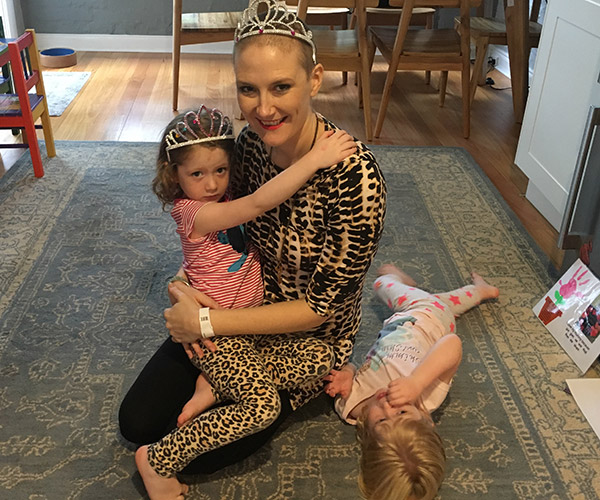PSA: 1769 women will die from gynaecological cancer in 2017. A morbid statistic, but this alarming figure also serves as a blunt reminder of one of the nation’s least talked-about killers.
The term gynaecological cancer groups together five life-threatening illnesses: ovarian cancer, uterine/endometrial cancer, cervical cancer, vulvar cancer and vaginal cancer. Collectively, these cancers are responsible for 8.6 per cent of all female cancer deaths in Australia.
Tragically, this is something Glenn Levett knows about too well; his beloved, Anne, passed away from ovarian cancer in 2002. She was just 49 years old.
“When Anne died, I couldn’t go in our bedroom,” Glenn tells us. “I couldn’t face sleeping in our bed without her.”
Glenn and Anne with their children before she passed away.
Then there’s mum-of-two, Caitlin Delaney, who, at aged 39, was diagnosed with stage-four ovarian cancer.
“Ovarian cancer is known as the ‘silent killer’ for a reason,” she reflects. “You see, many women’s symptoms don’t present themselves until it’s too late.”
Here’s what else you don’t know…

Caitlin with her daughters, Lilith and Willow.
Gynaecological cancer in numbers
6073 women will be diagnosed with gynaecological cancer this year alone.
4 women die from gynaecological in Australia every day.
Almost one third of women who have ovarian cancer will not survive five years after diagnosis.
Uterine (endometrial) cancer is one of the five most diagnosed cancers in women.
There is no test that covers all gynaecological cancers. The cervical cancer screening test identifies cervical cancer, but it doesn’t identify other types, including ovarian and endometrial cancers.
See the signs – and act on them
Depending on where a tumour may be in the body, how big it is and how quickly it’s growing, these are some of the symptoms to be aware of:
Unusual vaginal discharge
Abdomen swelling, as well as pain or discomfort in the abdomen
Pain during sex
Itching, soreness or burning sensations
Abnormal or persistent vaginal bleeding (like, bleeding after menopause, bleeding after sex, or if it’s happening when you don’t have your period)
Wart-like bumps, sores or lumps
Numerous conditions can cause these symptoms, but be sure to check in with your doctor, just to be safe.
Caitlin and Glenn have both pledged to advocate and raise money for the Australia New Zealand Gynaecological Oncology Group’s (ANZGOG) Save The Box campaign. Save The Box is a campaign dedicated to raising awareness and fundraising for gynaecological cancer research. Find out more about how easily you can join their money box challenge by visiting www.savethebox.com.au now.

